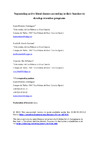Identificador persistente para citar o vincular este elemento:
https://accedacris.ulpgc.es/jspui/handle/10553/69415
| Título: | Segmenting Active Blood Donors According to Their Barriers to Develop Retention Programs | Autores/as: | Romero Domínguez, Laura Martín Santana, Josefa Delia Beerli Palacio, María Asunción |
Clasificación UNESCO: | 32 Ciencias médicas | Palabras clave: | African-American Donate Blood Motivations Recruitment |
Fecha de publicación: | 2019 | Proyectos: | La Orientación de Los Centros de Transfusión de Sangre Españoles Hacia Sus Principales Stakeholders Desde Una Perspectiva de Capital Social y Su Influencia en la Perfomance | Conjunto de datos relacionados: | https://accedacris.ulpgc.es/handle/10553/134947 | Publicación seriada: | Transfusion Medicine Reviews | Resumen: | Given the lack of a consensus on a catalogue of donation barriers, this study proposes a holistic scale of barriers which was used to segment Spanish active blood donors to define specific retention and loyalty strategies. A sample of 26 626 active donors from 14 of the 17 Spanish blood transfusion centers assessed a total of 25 barriers through an online survey. This scale was validated and 4 barrier categories were defined: Informative, Intrinsic, Time-space and Procedural. Segmentation was performed through k-means clustering. Four active donor clusters were created: (I) "Very Inhibited" (13.2%), who experienced a high number of barriers in all categories; (2) "Uninhibited" (46.9%), which was the largest cluster with fewer barriers; (3) "Apprehensive" (16.9%), whose most prevalent barriers were Informative and Intrinsic in nature; and (4) "Busy" (23.0%), who experienced mainly Time-space and Informative barriers. Afterward, depending on the size of the cluster, the presence of barriers, and the greater ease or difficulty to act on them, the attractiveness of each cluster was established to propose specific marketing actions. | URI: | https://accedacris.ulpgc.es/handle/10553/69415 | ISSN: | 0887-7963 | DOI: | 10.1016/j.tmrv.2019.06.004 | Fuente: | Transfusion Medicine Reviews [ISSN 0887-7963], v. 33 (3), p. 176-182 |
| Colección: | Artículos |
Citas SCOPUSTM
5
actualizado el 08-jun-2025
Citas de WEB OF SCIENCETM
Citations
6
actualizado el 22-feb-2026
Visitas
325
actualizado el 16-ene-2026
Descargas
93
actualizado el 16-ene-2026
Google ScholarTM
Verifica
Altmetric
Comparte
Exporta metadatos
Los elementos en ULPGC accedaCRIS están protegidos por derechos de autor con todos los derechos reservados, a menos que se indique lo contrario.
